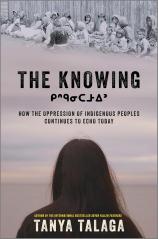The Knowing: How the Oppression of Indigenous Peoples Continues to Echo Today
Review
The Knowing: How the Oppression of Indigenous Peoples Continues to Echo Today
Getting a person’s name wrong is one of the most common social misdemeanors in existence. The error --- whether one of spelling, pronunciation or complete misidentification --- is usually put right in normal human interaction. In Canada, the correction is likely punctuated with multiple occurrences of “sorry.” But this was not Tanya Talaga’s experience, nor that of her Cree ancestors, nor that of virtually every other First Nations member alive today.
European colonizers considered Indigenous people unworthy of having accurate and unique personal identities. As a result, numerous individuals were literally lost in the files by generations of oppressive state-sanctioned “Indian” agencies. It was just another facet in a broad church and state program of intentional cultural genocide. Talaga uses the word with no uncertainty whatsoever.
In her gripping new book, THE KNOWING (which was first published in Canada in 2024), Talaga doggedly traces the protracted tragedy of a people whose names were not only distorted through numerous misspellings and familial misconnections, but often erased altogether and replaced with meaningless new ones, or just numbers. For Talaga, who spent decades as a skilled investigative news reporter, it all began with a search for her great-great grandmother, Annie Carpenter (whose Cree name was lost during her 19th-century childhood).
"The good news is that THE KNOWING was written for everyone. Rather than solely focusing on guilt and wrongdoing, it’s a passionate sharing of necessary truths through memorable personalities."
Following the huge collaborative effort of Canada’s Truth and Reconciliation Commission and its 94 calls to action to redress historic governmental injustices against First Nations, Inuit and Métis people, centuries of records from church organizations, fur trading companies and the notorious residential schools began to be more accessible. Many more continue to be withheld.
In researching THE KNOWING --- whose title captures the shared conviction that there are hard facts “out there” to confirm the dreams, nightmares, intuitions and fragmented memories that haunt generational survivors of abuse --- Talaga spent years tracing fragments of family information that often petered out or went nowhere.
With so many dead ends, but surprising and hopeful revelations as well, it was inevitable that the book would expand far beyond the chopped-up chronology of one unfortunate Cree woman whose final resting place turned out to be hidden in plain sight in a nearly forgotten Toronto hospital cemetery. That’s because the known fragments of Annie’s story were neither exceptional nor unusual. The only ones less important than Indigenous people in general were Indigenous women. Annie’s story became a sad template for numerous others.
Despite its nearly 460 pages, THE KNOWING is meticulously organized around the four spiritual directions of the Medicine Wheel: Yellow (east), Red (south), Black (west) and White (north). The size of the book is dwarfed by the vigorous momentum of its text. Within the lore and custom of each wheel segment, Talaga explores numerous branches of past and living history, covering generations of Indigenous lives that were broken, divided, separated and extinguished, especially through the horrific conditions of church- and government-run residential schools.
For more than a century, children were literally stolen from their families, incarcerated in classrooms where they learned next to nothing, chronically malnourished, worked to exhaustion, forbidden to speak anything but English, sexually abused, allowed to die from preventable illnesses, buried in mostly unmarked graves, and often never saw their parents again.
When the residential schools began to close in the 1960s (some hung on as late as the mid-1990s), Indigenous children continued to be stolen by various service agencies in a program that became known as “the Sixties Scoop.” Their parents, many of whom were residential school survivors, were deemed unsuitable to raise their own families. Instead of offering support and compensation, provincial governments removed their children.
THE KNOWING weaves together numerous headlines, disparate facts, stunning documentary evidence and cold statistics with anecdotal information from Indigenous elders who persevered to retain their detailed memories. Thousands of those memories were finally shared and recorded by the Truth and Reconciliation Commission, but thousands more were lost as survivors died in silence.
Talaga brings compelling and often uncomfortable presence to people who were once just carelessly misspelled names in old ledgers, anonymous numbers or nameless burials. They are all her relations, connected by kin and clan, culture and geography. Today their descendants are part of a vast and growing reclamation of truth, identity and long-overdue acknowledgment. And the rest of us have a lot of catching up to do.
The good news is that THE KNOWING was written for everyone. Rather than solely focusing on guilt and wrongdoing, it’s a passionate sharing of necessary truths through memorable personalities. As she follows the fragile thread of Annie Carpenter’s almost-extinguished existence, Tanya Talaga invites her readers into a story where we all have the potential to become deeply and mindfully informed participants in the reconciliation process.
Reviewed by Pauline Finch on August 8, 2025
The Knowing: How the Oppression of Indigenous Peoples Continues to Echo Today
- Publication Date: July 15, 2025
- Genres: History, Nonfiction
- Hardcover: 480 pages
- Publisher: Hanover Square Press
- ISBN-10: 1335015388
- ISBN-13: 9781335015389



